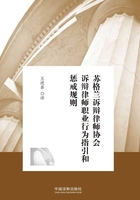
1.2 The Legal rights and Obligations of an Advocate
1.2.1 The historical rights and obligations of an Advocate as the holder of an office were explained by John Inglis, Lord President of the Court of Session and a former Dean of Faculty, in Batchelor v.Pattison & Mackersy (1876) 3 R.914, 918.
“An Advocate in undertaking the conduct of a cause in this Court enters into no contract with his client, but takes on himself an office in the performance of which he owes a duty, not to his client only, but also to the Court, to the Members of his own profession, and to the public.....[T] he nature of the Advocate’s office makes it clear that in the performance of his duty he must be entirely independent, and act according to his own discretion and judgment in the conduct of the cause for his client.His legal right is to conduct the cause without any regard to the wishes of his client, so long as his mandate is unrecalled, and what he does bonafide according to his own judgement will bind his client, and will not expose him to any action for what he has done, even if the client’s interests are thereby prejudiced.These legal powers of Counsel are seldom, if ever, exercised to the full extent, because Counsel is restrained by consideration of propriety and expediency from doing so.But in such a case as this it is necessary to have in view what is the full extent of their legal powers. The position of an agent [i.e.law agent or solicitor] is somewhat different.There is a contract of employment between him and his client, by virtue of which the client, for certain settled rates of remuneration, is entitled to require from the agent the exercise of care and diligence, and professional skill and experience.The general rule may fairly be stated to be that the agent must follow the instructions of his client.
But the general rule is subject to several qualifications. The agent, of course, cannot be asked to follow the client’s instructions beyond what is lawful and proper.For the agent, as well as the Counsel, owes a duty to the Court, and must conform himself to the rules and practice of the Court in the conduct of every suit.He is also bound by that unwritten law of his profession which embodies the honourable understanding of the individual Members as to their bearing and conduct towards each other.But above all in importance, as affecting the present question, is the undoubted special rule that when the conduct of a cause is in the hands of Counsel, the agent is bound to act according to his directions, and will not be answerable to his client for what he does bona-fide in obedience to such directions.”
1.2.2 That traditional view of the powers and liabilities of an Advocate has been considerably altered by practice and case law in succeeding generations.It is now not possible to rely on many parts of Lord President Ingles’ dictum with any degree of confidence.Some parts of the dictum still offer a sound analysis of the position of an Advocate.
1.2.3 An Advocate acts as such in performance of an office and has no contractual relationship with his client.It follows that he cannot perform any act which must, in law, be performed by the client or by someone empowered to act as an agent on his behalf.The acts of an Advocate are acts done upon his own responsibility in performance of an office and he does not, and cannot, in any sense, act as agent of his client; that is the function of a solicitor or other professional.Although it is commonly said that an accused person or litigant is“represented by an Advocate” or “represented by Counsel”, the use of these expressions should not be allowed to obscure the difference in law between the status and function of the Advocate and those of the agent.Thus, it is not appropriate for an Advocate to appear without an instructing agent if the client is not present.Equally, although it is said that the client or his agent “instructs an Advocate” or “instructs Counsel”, this does not mean that he can give orders.An Advocate is however obliged to follow instructions as to basic matters such as the line of defence in criminal cases.If he is unable to do so in a manner which allows him to fulfil his duties to the Court he should withdraw from acting.It should be noted however that whilst Counsel is not an agent of his client he may legally bind his client in matters falling within the Advocate’s particular mandate.Only in exceptional circumstances would an Advocate seek to bind his client on any matter central to a case without instructions to do so from the instructing solicitor(or other professional enjoying direct access)or the client.
1.2.4 It also follows from the fact that an Advocate acts as such in performance of an office that he cannot act in his professional capacity as an Advocate on his own behalf.He is, of course, free to plead his own cause in civil, criminal or other proceedings in exercise of his rights as an ordinary citizen, but he has no special rights or privileges by reason of the fact that he is an Advocate, nor may he wear wig or gown when doing so.
1.2.5 In order to preserve a Bar of independent Advocates it is necessary that an Advocate cannot enter into partnership with another Advocate or with any other person, or any employment or similar relationship, in connection with his practice as an Advocate.
1.2.6 An Advocate owes a variety of legal and moral obligations to his client, the Court, his professional colleagues and the legal profession generally.He does not directly owe any duty to his client’s opponents.